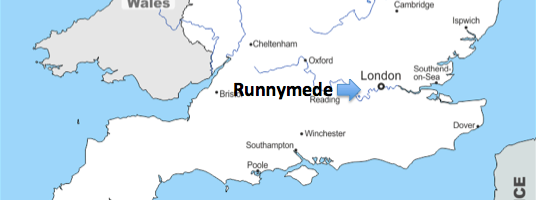
A European Journey #9 – Runnymede (England)
Birthplace of modern democracy?
Welcome to stage 9 of A European Journey.
After Bulgaria, we travel this week to England, and more specifically to the West of London. As we journey here along the Windsor road which goes outside the M25 surrounding the city, we see the river Thames on the right hand and a meadow on the left.
Let’s now turn left and walk a narrow footpath through the meadow until we reach a monument. You may be wondering what a monument would be doing here. The meadow is in fact called Runnymede and there is a plate which says: “Runnymede, the birthplace of modern democracy.” We’re in fact in the location where the Magna Carta was signed.
The Magna Carta (Great Charter) is probably one of the most famous political documents in history. Signed in June 1215 by king John Lackland, it was one of the first documents stating that all people, including the king, had to be subjected to the law.
But how did this Magna Carta come about? And can we really claim that it birthed modern democracy? To find an answer to these two questions we need to look back into history.
The Norman invasions led by William the Conqueror (king from 1066 to 1087) began a process of centralisation of power in England. This process culminated in the reign of Henry II (1154-1189) who had the control of every sphere of authority.
Under the reign of king Richard the Lionheart (1189-1199), local authorities began to gain more power again due to the king’s long absences during the Crusades.
The following king, John Lackland (1199-1216) attempted to recentralise power. This caused him to make enemies in practically every sphere of power in Britain, from the local authorities (the barons) to the church. Unfortunately for him, he was also confronted with struggles on the international scene, such as the war against France (1199-1206) and the quarrel with the pope (1206-1213), who was at the time an essential support to his authority as king.
In answer to their freedom being reduced, the church and the barons gathered together to form a confederation. Led by the Archbishop of Canterbury, Stephen Langton and several powerful northern barons, such as Robert Fitzwalter or Eustace de Vesci, they worked on the draft of what would later become the Magna Carta.
When the king returned to London after a crushing defeat in Normandy in a battle against the French, the confederates decided to confront him. They forced the king to negotiate with them and these negotiations took place right here in Runnymede. After several days of negotiations, the king accepted to sign the Magna Carta on the 15th of June 1215.
As I said earlier, the Magna Carta declared that everybody, including the king himself, was subject to the law. It also gave all freemen the right to justice and a fair trial, as well as guaranteeing justice for all. This was revolutionary at the time.
It is understandable that Runnymede is seen as the birthplace of modern democracy. But is this claim actually true? If not, where were these ideas actually born? To answer this question we need to take a step back and look even further back in history.
The ideas of the Magna Carta actually find their roots in the Hebrew Bible, which states that all humans are made in the image of God. This concept of human dignity was then reflected in the Law that God handed Moses on Mount Sinai. Through the Law, God gave a strong moral framework for the political and economical organisation of the new nation of Israel that had just been freed from slavery. As was the case with the Magna Carta, the Biblical Law was to be observed by all, and the king was no exception.
There is evidence that these ideals had spread through the Gospel early on in European history. For example, in the 9th century, the code of King Alfred the Great of Wessex (England) already contained the Ten Commandments, 66 verses of the Mosaic law and the Golden rule of Jesus (do to others as you would have them do to you).
At the time of the Magna Carta, Europe, and thus Britain, had been exposed to Christianity for nearly a millennium. While Runnymede was indeed a significant step toward modern democracy, its real birthplace was in fact mount Sinai.
Modern secularism, with its denial of the Christian faith, is severing Europe from the roots that gave birth to democracy. This should challenge and inspire modern-day Christians to stand in the gap, take a fresh look at the Bible and write a new Magna Carta.
See you next week somewhere else in Europe.
Cédric Placentino
Schuman Centre convener for Italian and French Europe
Follow A European Journey here.
Map: https://d-maps.com/index.php?lang=en

This Post Has 0 Comments